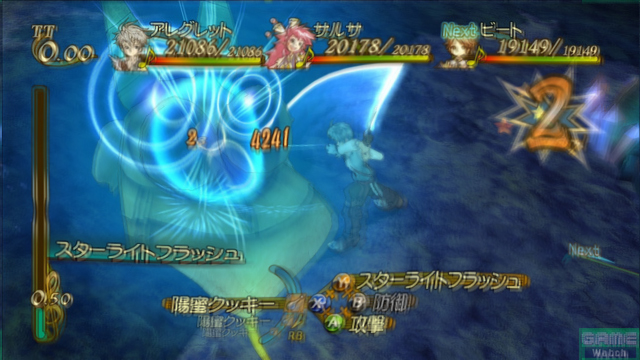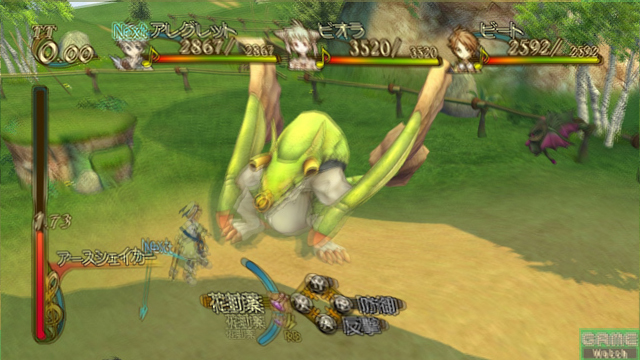|
|

|
PLATFORM
|
PS3
|
BATTLE SYSTEM
|

|
INTERACTION
|

|
ORIGINALITY
|

|
STORY
|

|
MUSIC & SOUND
|

|
VISUALS
|

|
CHALLENGE
|
Unbalanced
|
LANGUAGE BARRIER
|
Moderate
|
COMPLETION TIME
|
10-20 Hours
|
|
OVERALL

|
+ A .... unique soundtrack.
- Difficult to see what you're doing.
- Controls are awkward.
+ Mercifully short.
|
Click here for scoring definitions
|
|
|
Flush from victory over Final Fantasy XIII, I scoured the stores for another title to play on my new PS3. Price was certainly a deciding factor when I came across this game in the "Please take it!" section of my local Geo-Geo.
Trusty Bell 2: Bahha no Saitei no Musuko no Yopareta Jishitsu -- or to render it in English, Eternal Sonata 2: The Drunken Stupor of Bach's Least-Favored Son -- is not what one would expect. Rather than spend big money on a direct sequel which by the nature of the first game could not possibly exist, a cut-rate development team named de-Crescendo was commissioned to create a second game in a similar vein. This was but the first in a long sequence of questionable command decisions made in regards to this title.
As in the original game, Trusty Bell 2 follows the adventures of a composer in the last moments of his life as his fevered dreams become more real than reality -- except that in this game, the composer is really just sleeping it off in a ditch near Baden-Baden-Baden. The writers of de-Crescendo scraped the bottom of the proverbial barrel when they chose as a protagonist the last (and least) of Johann Sebastian Bach's twenty-one children, the late and unlamented P.D.Q. Bach.
Caught in the clutches of a truly epic bender, P.D.Q. finds himself whisked away to a magic land where music is a science, a religion, and an everyday miracle all in one. Naturally, once he has a chance to show his God-forsaken musical skills, P.D.Q. is quickly thrown out of town and into the garbage-filled wastes at the bottom of the world. It is there that he meets the game's second protagonist, Dunc Kopf, a young boy whose life strangely mirrors his own. Born naturally tone-deaf, he is unloved, unwanted, and was not even given a name until his father was threatened with legal action.
 There were only two screenshots available for this game. No one else would own up to playing it.
There were only two screenshots available for this game. No one else would own up to playing it.
|
|
Dunc has a mission, however -- in a gleaming palace at the top of the world exists a Golden Tune, a solid piece of music so powerful that it will make anyone a maestro. Dunc and P.D.Q. just need to find a bucket big enough to carry it, make it up the high slopes of the world, and take the tune from its resting place. They'll have to get past angry but lyrical lynch mobs, rampaging steam calliopes, the mysterious Man with the Left-Handed Sewer Flute, and the ghost of Dunc's father, the illustrious maestro Scheiss Kopf.
All this may make Trusty Bell 2 sound more interesting than it really is. It's not. The main quest can be completed in a short 10 hours, while the game's two optional side-plots perhaps double that number. The tale of the lovelorn cowboy Oedipus Tex was interesting enough, but the "Madrigals for Queen Thusnelda" subplot varied from boring to obscenely boring.
Challenge in this game is distinctly unbalanced for several reasons. Instead of going with the original game's leveling scheme, the developers opted for a skill-point system wherein points can be allocated to skill (needed to use instruments better and gain special attacks) and lung power (increases base attack power with instruments). The catch is, the more dissonant an attack is the more effective it is against the music-loving residents. So the game actually rewards the player for ignoring all of the available musical skills in favor of sheer lung capacity as P.D.Q. and Dunc blast away on instruments like dill piccolos, tromboons, slide whistles, and kazoos. Under this onslaught, most enemies cringe and curl into a fetal position within a few minutes.
Battles in Trusty Bell 2 may do little to challenge, but there is one major factor that makes this game more challenging -- the visuals. As most of the game is narrated by P.D.Q., the player must see the world as he does, through beer goggles. This was obviously done in part to make it less apparent that de-Crescendo ripped almost all the visuals straight from Eternal Sonata, and in part to induce in the player such a hideous headache that he or she only plays in short bursts, further padding the game's playing time.
 Seriously, these screenshots don't show just how blurry this game is.
Seriously, these screenshots don't show just how blurry this game is.
|
|
In addition to being an excuse for lousy visuals, P.D.Q.'s rampant drunkenness is the basis for one other annoying roadblock in the otherwise straight-arrow plotting of Trusty Bell 2, the H.O.D. system. An abbreviation for Hair Of Dog, the point of the H.O.D. system is simple: keep P.D.Q. drunk as a skunk. This reviewer spent more time battling for booze than he did advancing what passed for a plot, and for good reason. Once the protagonist sobers up the stupor is over, and the world ends in one hell of a hangover. Unfortunately, this "bad ending" proved more satisfying than the real one.
To add further insult to injury, the player must not only see the world through the eyes of a drunk, but he or she must navigate it the same way. The figure of P.D.Q. lurches back and forth across the screen, barely controlled by the player. Unfortunately, several levels are heavily trapped and while the trigger points are pretty obvious, getting P.D.Q. to avoid them becomes an exercise in futility. Even when left alone without input he will sometimes just stagger in a random direction for a few steps.
Perhaps the only saving grace this game has lies in its music. Trusty Bell 2 features a mostly live soundtrack (the exception being the graveyard level's rendition of "The Grossest Fugue" which features a mostly dead one). According to the credits in the game's manual, de-Crescendo hired the sole repertorie group in the world known to specialize in the works of P.D.Q. Bach, the King Congregational Church of Fay Raye, North Dakota, to lend the game a certain level of credibility. A few other tracks that stood out were the "Yrie-kay Eleison-ay" (which, while light and peppy, was completely at odds with the Cathedral in which it was played), the grand battle theme of "Concerto for Piano vs. Orchestra," and the boss theme version of "A Pervertimento for Bicycle, Bagpipes, and Balloons." The dramatic theme adaptation of "A Grand Serenade for an Awful Lot of Winds and Percussion" must be heard to be believed. If nothing else, this game has the most unique music in recent gaming history. Unfortunately the in-battle music is hampered by the need to listen to every combat instrument as it is used, which is as much a punishment for the player as it is for the enemy. This game mercifully does not support voice acting.
In the end I'm glad to have played Trusty Bell 2, if only because it lowered the bar so much that any game can seem more enjoyable in comparison. I would recommend this to anyone who is determined to play every game the PS3 has to offer, if only because I think it will change their minds on that endeavor. Personally, I'd just as soon sell it back to the secondhand store, but I have yet to find one willing to take it.
Review Archives
|









